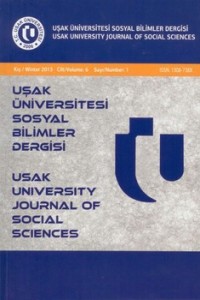Abstract
The main personal pronouns which have more powerful meaning and fortified with regard to the personal pronouns are called “rexlexivity pronouns”. İn today’s Turkey Turkish reflexivity pronoun is self.However, there are not too many samles of self pronouns that are used with the meaning of reflexivity pronouns. Self primarily has the features and functions of “self and principal” and also includes such features and functions as self inside, personally, notably and stiffeners. The origin of self in “OGUZ’s” that is a version of Turkish is ambiguous. The explanations, descriptions and opinions about the mophology and etymology of self differ. Different uses of pronoun and name in self, which has at least two words, there is regular mechanism and grammatical device operating system. A comparison based on third person would show structural proof of this system. All structures of self that are not appropriate in terms of the chronological and sequential relationships formed with their Turkish pronoun is contrary to the grammatical forms of assemly and the assembly sequence and organization.These structures, however, that “Galat”is commonly used words and phrases in text and audio language.
References
- Akçataş, A. (2010). Türkiye Türkçesinde Zamirlerin Anlam Yükü, Turkish Studies, 5/4, 1-14
- Ay, Ö. (2013). Türkiye Türkçesi Ağızlarında Kullanılan Dönüşlülük Zamir(ler)i, Diyalektoloji Üzerine, 7, 13-30.
- Banguoğlu, T. (1974). Türkçenin Grameri, TDK Yayınları, Ankara
- Ceritoğlu, M. (2014). Dönüşlülük Zamiri ve Kırgız Türkçesindeki Kullanımı Üzerine, Turkish Studies, 9/3, 351-364.
- Delice H. İ. (2012). Sözcük Türleri Nasıl Tasnif Edilmelidir?, Turkish Studies, 7/4, 27-34.
- Erdem, M. (2009). Zamirler anlamlı kelimeler midir, Yoksa Göervli Kelimeler mi?, Türk Dili, 641, 444-449.
- Ergin, M. (2002). Türk Dil Bilgisi, İstanbul: Bayrak Basın/ Yayım/ Tanıtım.
- Gadjieva N.Z., Serebrennikov B.A., (2011). Türk Dillerinin Karşılaştırmalı Tarihi Grameri, Çeviri Tevfik Hacıyev, Mustafa Öner, Ankara: TDK Yayınları.
- Gemalmaz, E. (1995). Türkçenin Morfo-Sentaktik Yapısının Fonolojisine Etkileri, Türkiyat Araştırmaları Ensrtitüsü Dergisi, 3, 1-7
- Gökdağ, B. A. (2011). Dil Beden İlişkileri Bağlamında Dönüşlülük Zamirleri, Dil Araştırmaları, 9, 9-22.
- Gülensoy, T. (2011). Türkiye Türkçesindeki Türkçe Sözcüklerin Köken Bilgisi Sözlüğü, Ankara: TDK Yayınları, C.I, s. 496.
- Gülsevin, G. (2007). Kutadgu Bilig’in Dilinde Lehçelerin özellikleri: ‘Denk Çiftler’ Turkish Studies, 2/2, 276-299.
- Güven, M. (2012). Türkiye Türkçesinde İyelik Gruplarının Dilbilgisel Düzeni ve İyelik Gruplarındaki Dilbilgisel Aykırılıklar, 5. Uluslararası Dünya Dili Türkçe Sempozyumu, 19-21 Aralık 2012, Pamukkale üniversitesi Bildiri Kitabı, Denizli-Türkiye.
- Koşaner, Ö. (2005). Türkçede Dönüşlü Yapıların Biçim-Sözdizimsel Özellikleri, Dokuz Eylül Üniversitesi Sosyal Bilimler Enstitüsü Basılmamış Yüksek Lisans Tezi, İzmir.
- König, E. (2001). İntennsifiers and Reflexive Pronouns, An International Handbook, (pp. 747-760). Berlin: Mouton de Gruyder.
- Räsänen, M. (1969). Versuch Eines Etymologischen Wörterbuchs Der Türksprachen, Helsinki: Suomalais-Ugrilainen Seura.
Abstract
Asıl şahıs zamirlerinden daha kuvvetli bir ifadeye sahip ve anlam bakımından berkitilmiş olan şahıs zamirlerine “dönüşlülük zamirleri” denir. Bugünkü Türkiye Türkçesinde dönüşlülük zamiri kendi’dir. Fakat kendi’nin zamir olarak dönüşlülük ifadesi ile kullanıldığı örnekler fazla değildir. Kendi başta “öz ve asıl” olmak üzere nefs, derun, bizzat, bahusus, özellik ve tekit gibi fonksiyonlar taşır. Oğuzca unsur olan kendi’nin kökeni belli değildir. Morfolojisi ve etimolojisi ile ilgili görüşler farklı, izah ve açıklamalar çeşitlidir. Zamir ve isim olarak farklı kullanımları olan “kendi”nin, en az iki veya daha fazla kelimeden meydana gelen öbeklerinde, kurallı bir düzenek ve bu düzeneği işleten dilbilgisel sistem vardır. 3. şahıslardan hareketle yapılacak bir karşılaştırma bu sistemi doğrulayacak biçimsel özellikler gösterir. Kendi zamiri ile oluşan ancak dizimsel ve dizisel ilişkiler bakımından denk düşmeyen yapılar Türkçenin dilbilgisel düzeneğine ve bu düzeneğin diziliş ve kuruluş biçimine aykırıdır. Böyle olmakla birlikte bu yapılar “galat” söz ve ibare olarak yazı ve konuşma dilinde yaygın olarak kullanılır.
References
- Akçataş, A. (2010). Türkiye Türkçesinde Zamirlerin Anlam Yükü, Turkish Studies, 5/4, 1-14
- Ay, Ö. (2013). Türkiye Türkçesi Ağızlarında Kullanılan Dönüşlülük Zamir(ler)i, Diyalektoloji Üzerine, 7, 13-30.
- Banguoğlu, T. (1974). Türkçenin Grameri, TDK Yayınları, Ankara
- Ceritoğlu, M. (2014). Dönüşlülük Zamiri ve Kırgız Türkçesindeki Kullanımı Üzerine, Turkish Studies, 9/3, 351-364.
- Delice H. İ. (2012). Sözcük Türleri Nasıl Tasnif Edilmelidir?, Turkish Studies, 7/4, 27-34.
- Erdem, M. (2009). Zamirler anlamlı kelimeler midir, Yoksa Göervli Kelimeler mi?, Türk Dili, 641, 444-449.
- Ergin, M. (2002). Türk Dil Bilgisi, İstanbul: Bayrak Basın/ Yayım/ Tanıtım.
- Gadjieva N.Z., Serebrennikov B.A., (2011). Türk Dillerinin Karşılaştırmalı Tarihi Grameri, Çeviri Tevfik Hacıyev, Mustafa Öner, Ankara: TDK Yayınları.
- Gemalmaz, E. (1995). Türkçenin Morfo-Sentaktik Yapısının Fonolojisine Etkileri, Türkiyat Araştırmaları Ensrtitüsü Dergisi, 3, 1-7
- Gökdağ, B. A. (2011). Dil Beden İlişkileri Bağlamında Dönüşlülük Zamirleri, Dil Araştırmaları, 9, 9-22.
- Gülensoy, T. (2011). Türkiye Türkçesindeki Türkçe Sözcüklerin Köken Bilgisi Sözlüğü, Ankara: TDK Yayınları, C.I, s. 496.
- Gülsevin, G. (2007). Kutadgu Bilig’in Dilinde Lehçelerin özellikleri: ‘Denk Çiftler’ Turkish Studies, 2/2, 276-299.
- Güven, M. (2012). Türkiye Türkçesinde İyelik Gruplarının Dilbilgisel Düzeni ve İyelik Gruplarındaki Dilbilgisel Aykırılıklar, 5. Uluslararası Dünya Dili Türkçe Sempozyumu, 19-21 Aralık 2012, Pamukkale üniversitesi Bildiri Kitabı, Denizli-Türkiye.
- Koşaner, Ö. (2005). Türkçede Dönüşlü Yapıların Biçim-Sözdizimsel Özellikleri, Dokuz Eylül Üniversitesi Sosyal Bilimler Enstitüsü Basılmamış Yüksek Lisans Tezi, İzmir.
- König, E. (2001). İntennsifiers and Reflexive Pronouns, An International Handbook, (pp. 747-760). Berlin: Mouton de Gruyder.
- Räsänen, M. (1969). Versuch Eines Etymologischen Wörterbuchs Der Türksprachen, Helsinki: Suomalais-Ugrilainen Seura.
Details
| Primary Language | Turkish |
|---|---|
| Journal Section | Articles |
| Authors | |
| Publication Date | September 29, 2015 |
| Published in Issue | Year 2015 Volume: 8 Issue: 4 |
Address: Uşak University Graduate Education Institute
Telephone: 0276 221 21 60 Fax: 0276 221 21 61
E-mail: sosyaldergi@usak.edu.tr


